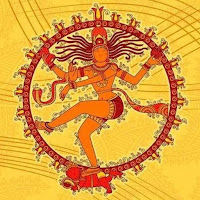~Katha 1.3.10-11 (tr-Nikhilananda)
The first manifestation of Pure Brahman, due to Its association with ajnana, is called the Unmanifest. The first entity to emerge from the Unmanifest is Hiranyagarbha, also known by such other epithets as Brahma (the World Soul, or the Cosmic Mind) and Prana (the Cosmic Life).
It may be stated here that the purpose of the Vedantic cosmology is to explain the universe and its origin in such a way that it can establish the sole reality of Brahman, apart from which the universe is unimportant either from the standpoint of reality or from the standpoint of ultimate value. In the deepest spiritual experience the material universe is found to be non-existent.
~Nikhilananda
The wise man should merge his speech in his mind, and his mind in his intellect. He should merge his intellect in the Cosmic Mind, and the Cosmic Mind in the Tranquil Self.
~Katha 1.3.13 (tr-Nikhilananada)
The activities of the senses should be stopped and the attention directed to the mind. Then the mind should be drawn into the buddhi, or discriminative faculty. Next the aspirant should sink the buddhi into the Cosmic Mind, or Hiranyagarbha. In other words, he should make his mind as pure as the Cosmic Mind, which is free from all notions of discrete individuality. Last, the thin veil of the Cosmic Mind should be rent, and the seeker should merge in the Absolute, which is calm because of an utter absence of any distinction or difference either with regard to others or within Itself.
~Nikhilananda
Shankara's Sanskrit Commentary:
Prajnah, the discriminating man;
yacchet, should merge. What (should he merge)?
Vak, i.e. vacam, the organ of speech, (i.e. all the organs), vak being used suggestively for all organs. Where?
Manasi, into the mind; the use of the word with a long i is a Vedic licence.
Tat, that mind, again;
yacchet, he should merge;
jnane atmani, into the intellect - bright by nature-which is their self; as the intellect pervades the organs, beginning with the mind, it is their self, their innermost principle.
Jnanam, the intellect;
niyacchet, he should dissolve;
mahati atmani, in the Great Soul-the First Born (Hiranyagarbha). The idea is that he should make the intelligence as clear in its nature as is the First Born. And that Great Soul again,
yacchet, he should sink;
sante, into the peaceful -whose nature does not admit of any distinction, which is unchangeable; (into that peaceful)
atmani, Self-into the real Self which is within all and is the witness of all the modifications of the intellect.
~Shankara (tr-Gambhirananda)

No comments:
Post a Comment